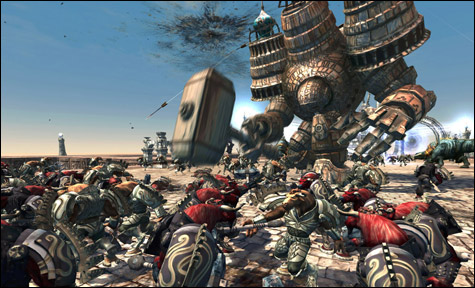
MASH-UP: There's no storyline to speak of here — just pure competition. |
| Demigod | For Windows XP and Vista | Rated T for Teen | Developed by Gas Powered Games | Published by Stardock |
One of the biggest mysteries of the video-game marketplace is why the PC seems to lag so far behind consoles as a gaming platform. After all, Windows computers have the kind of market penetration that Sony and Nintendo can only dream of. There are hundreds of millions of users worldwide, a fact that dwarfs even the continuing Wii sales of several million units per month. And no one doubts that computers are more powerful than traditional set-top game platforms — PC games pioneered Internet play and high-definition graphics in the mid '90s, when console players still thought CD-ROMs were on the cutting edge.But it only takes a few minutes with a computer game to understand why consoles are so much more appealing to the average gamer. I sat down to play Demigod at seven o'clock on a weeknight. The 3GB install took several minutes to complete. Then I had to launch Impulse, a front end from publisher Stardock that's required to run any of its games. Time to play Demigod! Oops, had to download an update to Impulse first. And then a mandatory patch to the game itself. All told, it took about 45 minutes before I could actually play the thing.

Granted, the newest generation of game consoles has also made updates and patches an unavoidable part of the experience. But it's still true that you load a disc into your PlayStation, Xbox, or Wii and it works. It works as well as it does on anybody else's system. You aren't grappling with different components, updating drivers, and massaging your operating system. Not only that, but the games' graphics improve as a console progresses through its lifespan. What looks great at a system's launch seems quaint five years later. When you buy a PC, on the other hand, you have to make continual costly upgrades — otherwise, five years later you won't even be able to run top-of-the-line software.
The good news is that Demigod is not a system hog in the vein of Crysis. Even my four-year-old Dell could run it, albeit slowly and choppily. The game itself is an interesting mash-up of several genres. It looks like a Diablo-style dungeon crawler, with an isometric perspective and hordes of opposing foes to mash through. Heavy RPG elements allow you to gain experience and upgrade your character's abilities through a skill-tree system. Several unique playable characters are available, so the customization runs deep.
This is a strategy game in which two armies battle for control of territory. It's different from your typical real-time strategy game in that your army mostly operates under its own control while you and your teammates control the powerful demigods. The action takes place across eight arenas that make no pretense of representing actual locales in any contiguous physical world. In fact, there's no storyline to speak of here — just pure competition. A few different game modes all boil down to capturing and holding territory while destroying your opponents' structures.
Getting to the strategy portion is the real trick. Demigod is supposed to be designed so that anybody can just dive into a game. And you can do that, provided you don't mind wandering around dazed and watching your demigod fall victim to advancing armies over and over. What's more, the mouse-driven interface, which is supposed to be simple, ends up complicating things. You can scroll in and out with the mouse wheel, but to move around the map, you need to press and hold the mouse wheel, and, well, guess how easy it is to zoom when you want to drag the map? This would never happen on a console.
Read Mitch Krpata's blog at insultswordfighting.blogspot.com.